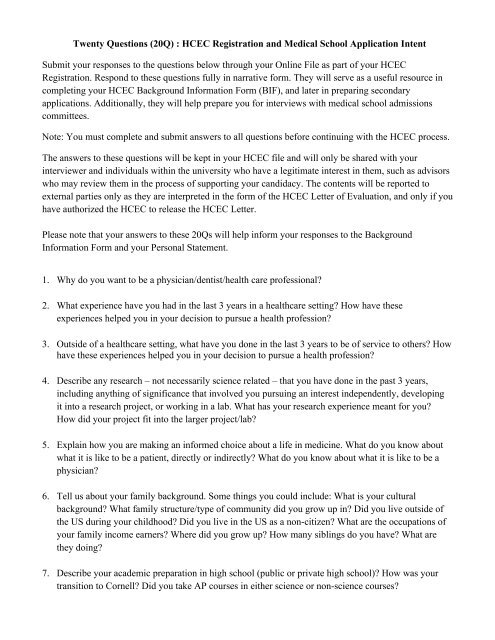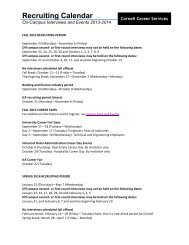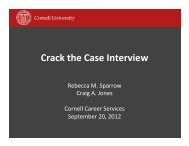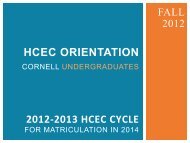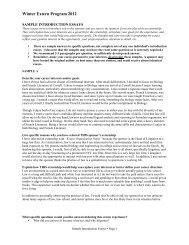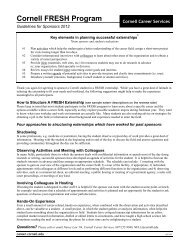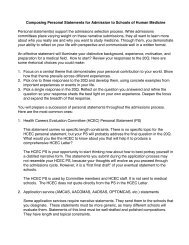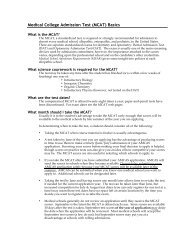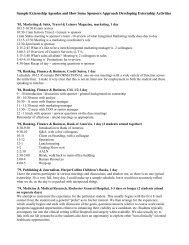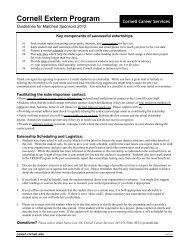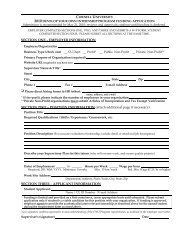20 Questions - Cornell Career Services
20 Questions - Cornell Career Services
20 Questions - Cornell Career Services
You also want an ePaper? Increase the reach of your titles
YUMPU automatically turns print PDFs into web optimized ePapers that Google loves.
Twenty <strong>Questions</strong> (<strong>20</strong>Q) : HCEC Registration and Medical School Application Intent<br />
Submit your responses to the questions below through your Online File as part of your HCEC<br />
Registration. Respond to these questions fully in narrative form. They will serve as a useful resource in<br />
completing your HCEC Background Information Form (BIF), and later in preparing secondary<br />
applications. Additionally, they will help prepare you for interviews with medical school admissions<br />
committees.<br />
Note: You must complete and submit answers to all questions before continuing with the HCEC process.<br />
The answers to these questions will be kept in your HCEC file and will only be shared with your<br />
interviewer and individuals within the university who have a legitimate interest in them, such as advisors<br />
who may review them in the process of supporting your candidacy. The contents will be reported to<br />
external parties only as they are interpreted in the form of the HCEC Letter of Evaluation, and only if you<br />
have authorized the HCEC to release the HCEC Letter.<br />
Please note that your answers to these <strong>20</strong>Qs will help inform your responses to the Background<br />
Information Form and your Personal Statement.<br />
1. Why do you want to be a physician/dentist/health care professional?<br />
2. What experience have you had in the last 3 years in a healthcare setting? How have these<br />
experiences helped you in your decision to pursue a health profession?<br />
3. Outside of a healthcare setting, what have you done in the last 3 years to be of service to others? How<br />
have these experiences helped you in your decision to pursue a health profession?<br />
4. Describe any research – not necessarily science related – that you have done in the past 3 years,<br />
including anything of significance that involved you pursuing an interest independently, developing<br />
it into a research project, or working in a lab. What has your research experience meant for you?<br />
How did your project fit into the larger project/lab?<br />
5. Explain how you are making an informed choice about a life in medicine. What do you know about<br />
what it is like to be a patient, directly or indirectly? What do you know about what it is like to be a<br />
physician?<br />
6. Tell us about your family background. Some things you could include: What is your cultural<br />
background? What family structure/type of community did you grow up in? Did you live outside of<br />
the US during your childhood? Did you live in the US as a non-citizen? What are the occupations of<br />
your family income earners? Where did you grow up? How many siblings do you have? What are<br />
they doing?<br />
7. Describe your academic preparation in high school (public or private high school)? How was your<br />
transition to <strong>Cornell</strong>? Did you take AP courses in either science or non-science courses?
8. When you have been faced with multiple demands, how have you managed priorities – academic vs.<br />
extracurricular? How have you become better at this during your college years?<br />
9. Who are your role models and why?<br />
10. We define a personal strength as something that, when you do it, makes you feel strong,<br />
competent, effective, as well as something you do well. Describe your strengths. What do you<br />
think you are best at of the activities you regularly do in your daily life?<br />
11. We define a personal weakness as something that, regardless of your skill at it, when you do it, it<br />
drains you. Personal weaknesses could also include tasks for which you have an innate aversion, or<br />
simply things you don't naturally do very well. Given these definitions, describe your weaknesses.<br />
What are your principal faults? What do you think you are worst at of the activities you regularly do<br />
in your daily life? How do you try to overcome your weaknesses or faults?<br />
12. How would your best friends describe you?<br />
13. How do you handle your mistakes or errors? How would you handle them in medical practice?<br />
14. In your college years, what did you do besides study a lot? Give an overview here, concentrating on<br />
describing the big picture. What are your personal interests and talents? How did you become<br />
interested in your hobbies, pursuits, or avocations?<br />
15. What life events or activities have changed you the most in the past 3-4 years, and how have they<br />
changed you?<br />
16. What experience have you had leading large or small groups of people? Think about leadership in<br />
broad terms that include not only offices you have held, but experiences such as tutoring and<br />
mentoring others.<br />
17. If you could begin college again, what would you do differently? What would you do the same<br />
way again?<br />
18. How have you developed cultural competence over the years since you lived at home? How did you<br />
gain cultural competence in your years at <strong>Cornell</strong>? Have you had international experience in a<br />
healthcare setting? Can you describe an experience or situation in which you became conscious that<br />
you were interacting with others who were different from you? How did it affect you?<br />
19. Recognizing that you have much to learn about different medical careers, what type of medical<br />
practice interests you at this point? (Rural vs. urban? Primary care vs. specialty?<br />
Academic/research vs. private practice? Global health/International?)<br />
<strong>20</strong>. What would you like to see emphasized in your HCEC Letter/application?
Supplemental Question - OPTIONAL - This question is not sent to the HCEC. An affirmative response<br />
should be shared with your health careers advisor.<br />
Have you ever been the subject of an institutional action (i.e., a disciplinary action resulting from an<br />
unacceptable academic performance, a conduct violation, or a criminal act)?<br />
Even if you were exonerated of charges, it is worth writing about them and discussing them with an<br />
advisor. In a separate place outside of the HCEC Registration, please describe what happened, what<br />
agencies got involved, and what you know about whether –– and under what circumstances –– the<br />
university or civil agency can or will report the action or offense to external parties. Finally, relate<br />
what you learned from the experience. If you have been subjected to such action, we suggest that you<br />
schedule a meeting to talk to your health careers advisor about this. This information is rarely<br />
discussed in a letter of evaluation, but with guidance, you can learn the best way to share it with<br />
schools.


